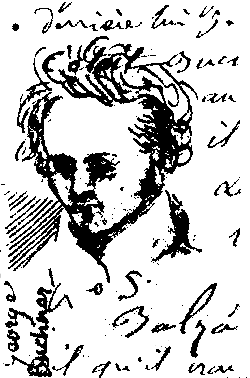Georg Büchner
Karl Georg Büchner (October 17, 1813 – February 19, 1837) was a German dramatist and writer of prose. He was the brother of physician and philosopher Ludwig Büchner. Georg Büchner's talent is generally held in great esteem in Germany. It is widely believed that, but for his early death, he might have attained the significance of such central German literary figures as Johann Wolfgang von Goethe and Friedrich Schiller.
Born in Goddelau near Darmstadt, Hesse-Darmstadt, the son of a doctor, Büchner attended a Humanist secondary school that focused on modern languages, including (French, Italian and English). Nevertheless Büchner studied medicine in Strasbourg.
In 1828 he became interested in politics and joined a circle of William Shakespeare aficionados which later on probably became the Gießen and Darmstadt section of the "Gesellschaft für Menschenrechte" (Society for Human Rights). In Strasbourg, he immersed himself in French literature and political thought. In 1835, Büchner translated two works by Victor Hugo, Lucrèce Borgia and Marie Tudor. Two years later, his dissertation, "Mémoire sur le Système Nerveux du Barbeaux (Cyprinus barbus L.)" was published in Paris and Strasbourg. He was influenced by the utopian communist theories of François-Noël Babeuf and Claude Henri de Rouvroy, Comte de Saint-Simon.
While he continued his studies in Gießen he established a secret society dedicated to the revolutionary cause. With the help of Friedrich Ludwig Weidig he published the leaflet Der hessische Landbote, aimed at the perceived political education and indoctrination of peasants. Charged with treason, Büchner fled to France.
In 1835, his first play, Danton's Tod (Danton's Death), about the French revolution, was published, followed by Lenz (first partly published in Karl Gutzkow's and Wienberg's Deutsche Revue, which was quickly banned); Lenz is a novella based on the life of the Sturm und Drang poet Jakob Michael Reinhold Lenz. In 1836 his second play, Leonce and Lena, followed (about the nobility). His unfinished and most famous play, Woyzeck, was the first literary work in German whose main characters were members of the working class. Published posthumously, it became the basis for Alban Berg's opera Wozzeck (premiered 1925).
By the 1870s, Büchner was nearly forgotten in Germany when Karl-Emil Franzos edited his works, which later became a major influence on naturalism and expressionism. Arnold Zweig called Lenz, Büchner's only work of prose, the "beginning of modern European prose".
Büchner died in Zürich, shortly after he had begun lecturing at the university.
External links
- Works by Georg Büchner. Project Gutenberg
- Büchner's birthplace
Editions
- Georg Büchner, Werke und Briefe. Münchner Ausgabe (dtv, 1997). ISBN 3423123745.
Translations
- Georg Büchner, Complete Plays and Prose, trans. Carl Richard Mueller (Hill and Wang, 1963)
- Georg Büchner, The Complete Plays: Danton's Death; Leonce and Lena; Woyzeck; Lenz; the Hessian Messenger; on Cranial Nerves; Selected Letters trans. John Reddick (Penguin Classics, 1993) ISBN 0140445862.
- Georg Büchner, Danton's Death, Leonce and Lena and Woyzeck, trans. Victor Price, (Oxford World's Classics, 1998). ISBN 0192836501.
There are many translations of the individual plays.
| Persondata | |
|---|---|
| NAME | Büchner, Georg |
| ALTERNATIVE NAMES | Büchner, Karl Georg |
| SHORT DESCRIPTION | German playwright |
| DATE OF BIRTH | 17 October, 1813 |
| PLACE OF BIRTH | Goddelau near Darmstadt, Hessen-Darmstadt |
| DATE OF DEATH | 19 February, 1837 |
| PLACE OF DEATH | Zürich |
Credits
New World Encyclopedia writers and editors rewrote and completed the Wikipedia article in accordance with New World Encyclopedia standards. This article abides by terms of the Creative Commons CC-by-sa 3.0 License (CC-by-sa), which may be used and disseminated with proper attribution. Credit is due under the terms of this license that can reference both the New World Encyclopedia contributors and the selfless volunteer contributors of the Wikimedia Foundation. To cite this article click here for a list of acceptable citing formats.The history of earlier contributions by wikipedians is accessible to researchers here:
The history of this article since it was imported to New World Encyclopedia:
Note: Some restrictions may apply to use of individual images which are separately licensed.
